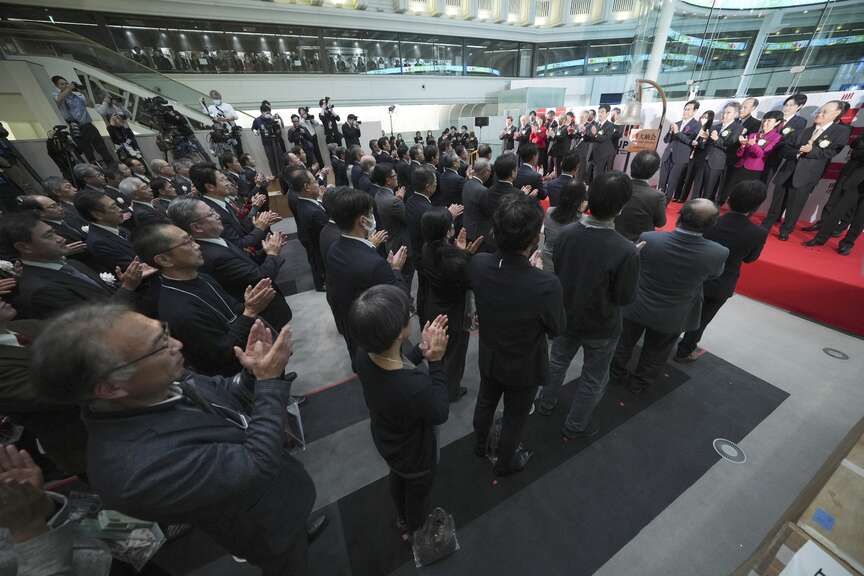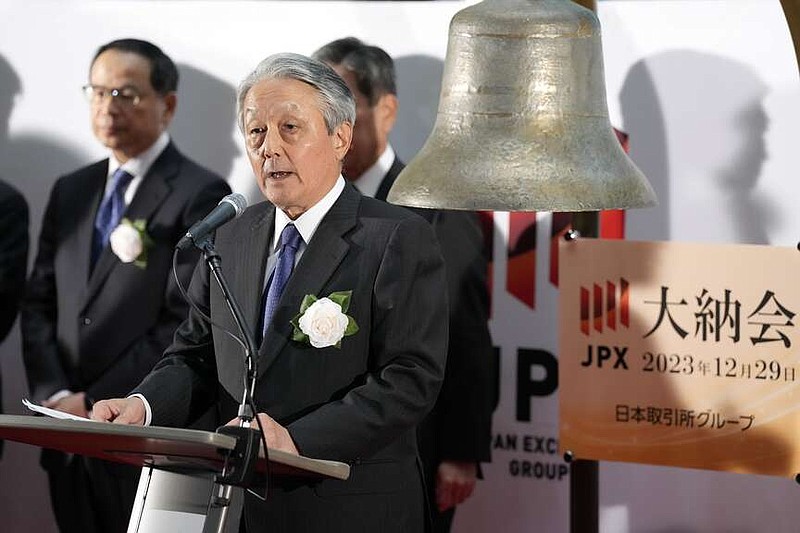NEW YORK -- The S&P 500 closed out 2023 with a gain of more than 24% and the Dow Jones Industrial Average finished near a record high, as easing inflation, a resilient economy and the prospect of lower interest rates buoyed investors, particularly in the last two months of the year.
The broader market's gains were driven largely by a group of technology companies, which include Apple, Microsoft, Alphabet, Amazon, Nvidia, Meta Platforms and Tesla. They accounted for about two-thirds of the gains in the S&P 500 this year, according to S&P Dow Jones Indices. Nvidia lead the group with a gain of about 239%.
The S&P 500's annual gain was far better than analysts had expected at the beginning of the year. "Nobody was calling for 20% last January. ... I mean nobody," said Michael Farr of the D.C.-based investment firm Farr, Miller & Washington.
The S&P 500 is a market-tracking index that underpins the retirement fortunes of millions of Americans.
Most major indexes were able to erase their losses from a dismal 2022. Smaller company stocks had a late rally, but managed to erase the bulk of their losses from last year. The Russell 2000 index finished 2023 with a 15.1% gain after falling 21.6% in 2022.
The rally that started in November helped broaden the gains within the market beyond just the big technology companies. It marked a big psychological shift for investors, said Quincy Krosby, chief global strategist at LPL Financial.
"Investors were able to accept that fact that the market would close the year on a higher note," Krosby said. "Above all else, it was broad participation in the market that reinforced and confirmed gains for smaller company stocks that were particularly important."
Stocks closed Friday with modest losses.
The S&P 500 slipped 13.52 points, or 0.3%, to 4,769.83. That is still just 0.6% shy of an all-time high set in January of 2022 and it still left the benchmark index with a rare ninth consecutive week of gains.
The Dow fell 20.56 points, or 0.1%, to 37,689.54 after setting a record Thursday.
The Nasdaq composite slipped 83.78 points, or 0.6%, to 15,011.35, but that was barely a blemish on an annual gain of more than 43%, its best performance since 2020.
Markets have shown signs of exhaustion after the more than $8 trillion surge in the S&P 500 this year. Despite concerns ranging from Federal Reserve uncertainty and recession jitters to geopolitical risks, the gauge notched its ninth straight week of gains.
"The market shows signs of fatigue and undoubtedly needs to consolidate," said Krosby. "As long as participation remains broad, the bullish sentiment should carry the indexes as they navigate geopolitical and domestic scenarios, and an overarching positive consensus that 2024 will be a similarly strong year."
Investors in the U.S. came into the year expecting inflation to ease further as the Federal Reserve pushed interest rates higher. The trade-off would be a weaker economy and possibly a recession. But while inflation has come down to around 3%, the economy has chugged along thanks to solid consumer spending and a healthy job market.
The stock market is now betting the Fed can achieve a "soft landing," where the economy slows just enough to snuff out high inflation, but not so much that it falls into a recession. At the start of 2023, analysts saw a 65% chance that the year would see a recession, according to a consensus estimate referenced by Goldman Sachs.
As a result of shrinking inflation, investors now expect the Fed to begin cutting rates as early as March.
The Fed has signaled three quarter-point cuts to the benchmark rate next year. That rate is currently sitting at its highest level, between 5.25% and 5.50%, in two decades.
That could add more fuel to the broader market's momentum in 2024. High interest rates and Treasury yields hurt prices for investments, so a continued reversal means more relief from that pressure. Wall Street is forecasting stronger earnings growth for companies next year after a largely lackluster 2023, with companies wrestling with higher input and labor costs and a shift in consumer spending.
"The notion that the major central banks have surely done enough to quell the inflationary surge of 2022-23 is powering the rally," said Brian Barish at Cambiar Investors LLC. "It's not hard to imagine new things for the markets to be concerned by, such as elections, the sizable bond funding requirements of the U.S. government, and/or any notion that inflation resurges anew. But for now, there's not much news and not a lot of sellers."
Bond market investors appeared headed for a third losing year in a row until things turned around starting in late October. Excitement about potential cuts to interest rates sent bond prices soaring and yields dropping. The yield on the 10-year Treasury, which hit 5% in October, stood at 3.88% Friday, up from 3.85% on Thursday.
The yield on The two-year Treasury, which more closely tracks expectations for the Fed, fell to 4.25% from 4.28% from late Thursday. It also surpassed 5% in October.
U.S. and international crude oil prices were relatively stable on Friday. The price of oil tumbled by more than 10% this year, defying predictions from some experts that it could cross $100 per barrel.
Despite production cuts from OPEC, a war involving energy exporter Russia and another in the Middle East, U.S. benchmark crude dropped nearly 11% in 2023, and a whopping 21% in the final three months of the year.
Increased production in the U.S., now the top oil producer in the world, as well as Canada, Brazil and Guyana offset the reduced output from OPEC. Not all OPEC members participated in the cuts and some countries like Iran and Venezuela are pumping more oil, energy analysts say.
Shares in European markets edged higher Friday, also after a year of gains. Benchmark indexes in France and Germany made double-digit advances, while Britain's has climbed just under 4%.
Asian markets had a mixed session on the last trading day of the year for most markets. Tokyo's Nikkei 225 gave up 0.2% to 33,464.17. It gained 27% in 2023, its best year in a decade as the Japanese central bank inched toward ending its longstanding ultra-lax monetary policy after inflation finally exceeded its target of about 2%.
The Hang Seng index in Hong Kong ended flat, while the Shanghai Composite index gained 0.7%. The Shanghai index lost about 3% this year and the Hang Seng fell nearly 14%. Weakness in the property sector and in global demand for China's exports, as well as high debt levels and wavering consumer confidence have weighed on the country's economy and the stock market.
Information for this article was contributed by Damian J. Troise and Charles Sheehan of The Associated Press, Rita Nazareth of Bloomberg News and Aaron Gregg of The Washington Post.
 Participants perform a traditional hand clap at the end of a ceremony to conclude the year's trading on the Tokyo Stock Exchange Friday, Dec. 29, 2023, in Tokyo. Asian shares were mixed in muted trading on Friday, the last trading day of the year, with some regional markets logging solid gains in 2023 while many sagged. (AP Photo/Eugene Hoshiko)
Participants perform a traditional hand clap at the end of a ceremony to conclude the year's trading on the Tokyo Stock Exchange Friday, Dec. 29, 2023, in Tokyo. Asian shares were mixed in muted trading on Friday, the last trading day of the year, with some regional markets logging solid gains in 2023 while many sagged. (AP Photo/Eugene Hoshiko) Media wait for the ceremony to mark the last trading day of the year at the Tokyo Stock Exchange in Tokyo, Japan, Friday, Dec. 29, 2023. Asian shares were mixed in muted trading on Friday, Dec. 29, the last trading day of the year, with some regional markets logging solid gains in 2023 while many sagged.(AP Photo/Eugene Hoshiko)
Media wait for the ceremony to mark the last trading day of the year at the Tokyo Stock Exchange in Tokyo, Japan, Friday, Dec. 29, 2023. Asian shares were mixed in muted trading on Friday, Dec. 29, the last trading day of the year, with some regional markets logging solid gains in 2023 while many sagged.(AP Photo/Eugene Hoshiko) Participants perform a traditional hand clap at the end of a ceremony to conclude the year's trading on the Tokyo Stock Exchange Friday, Dec. 29, 2023, in Tokyo. Asian shares were mixed in muted trading on Friday, the last trading day of the year, with some regional markets logging solid gains in 2023 while many sagged. (AP Photo/Eugene Hoshiko)
Participants perform a traditional hand clap at the end of a ceremony to conclude the year's trading on the Tokyo Stock Exchange Friday, Dec. 29, 2023, in Tokyo. Asian shares were mixed in muted trading on Friday, the last trading day of the year, with some regional markets logging solid gains in 2023 while many sagged. (AP Photo/Eugene Hoshiko)
